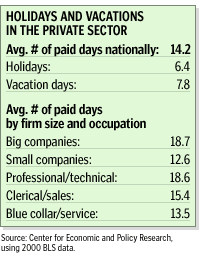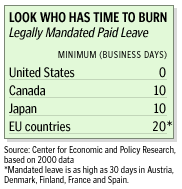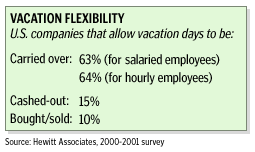
NEW YORK (CNN/Money) -
Would you ever voluntarily give back your paycheck to an employer? Probably not. But you might have anyway.
I did. That's because I didn't use all my vacation time last year.
It was only a couple of days gone to waste (more if you count unused sick and personal days).
Apparently I'm in good company. Expedia.com's "Vacation Deprivation" annual survey found that many Americans don't use all their vacation time, having forfeited an average of 1.8 days in 2001.

Less than two days may not sound like much. But put another way, 1.8 days on average per worker provided companies with $19.5 billion in unscheduled productivity in 2001, according to Expedia.com's estimates.
(In other words, the employer planned to pay you not to show up for work and budgeted for that loss of productivity. By coming in anyway, you gave your boss a bonus.)
When you forfeit paid leave that's already been budgeted for, "you're handing money back to your employer. ... Your own personal time is money. People have to value their free time because it's your time for living," said Joe Robinson, author of "Work to Live" and founder of the Work to Live campaign, which is lobbying Congress to mandate a minimum of three weeks vacation for U.S. workers.
The United States, by the way, is the only industrialized nation that does not have mandatory paid leave for workers, despite the fact that U.S. workers put in more hours per year than any other workers in the industrialized world, according to the Center for Economic and Policy Research (CEPR).

What's more, CEPR found that among industrialized nations we enjoy the fewest number of paid days off (14.2 on average, including holidays, compared with a minimum of 20 days for European Union members, although several EU countries mandate as many as 30).
Add to that the fact that you usually set the vacation clock back to a minimum two weeks every time you take a new job and – well, let's face it, we're a little vacation-starved as a country.
That malnourishment can affect your health. Studies have shown that taking regular vacations can reduce stress and the risk of premature death from heart attacks and high blood pressure. Look at it this way, Robinson said: "Time off is medicine.
If ever you've let vacation days go to waste, you've probably used one of the following excuses:
I planned badly or I have no plans. Part of the reason I end up with unused vacation time is because it rarely occurs to me I need time off until I feel a tell-tale sign of burnout: everyone at work starts sounding like the teacher in "Peanuts" ("Waah, wah-wah wah waaah").
No surprise, apparently. "MRI images of fatigued brains look like ones that are sound asleep," Robinson said.
He advocates we do as the Europeans do. Plan a year's worth of vacations in January so you and your employer book the time off. "Great vacations don't happen at the last second. When you don't have any plans, you wind up working by default," he writes.
He also suggests companies cross-train workers so there's always someone to fill in for absent colleagues.
I'm just too busy. Job demand is the top excuse among the 25 percent of Americans who forfeit vacation time. Sometimes the perception of being too busy is self-imposed. But "unless the work is a true emergency, busyness is not a valid reason for shunting vacations aside," writes Robinson.

And sometimes employers might tell you the weeks you want to schedule are "not a good time." There are certainly periods when it's reasonable for your manager to insist all hands be on deck, but if you get that message too often, you should either assert your rights (you have a legal right to take paid leave if the company has a vacation policy, Robinson said) or consider looking for a new job.
There are companies that value the "work hard, play hard" ethic and encourage employees to rest and rejuvenate, said former human resources executive and lawyer Lee Miller. (To begin your search, check Fortune's list of the 100 Best Companies to Work For.)
I don't want to get laid off. Who does? But it's unclear that working non-stop will offer you protection. In 17 years of representing laid-off employees in severance negotiations, attorney Alan Sklover has never heard that using one's allotted vacation made an employee a greater target for a layoff.
Then again, it's not crazy to think a little sacrifice might pay off. A lot depends on the office culture and your seniority – the higher up you are, the more likely it is you'd be expected to forfeit a little time if need be, especially if your boss does, Miller said. But in terms of layoffs, using your vacation days might only be a consideration if your boss already thinks you're not working hard enough or are not a team player. But, he added, "it's not the do-or-die thing."
I can't. They need me. Oh, you sweet ego maniac, of course they do. But they'll be just fine without you for a week or two, especially if you're a smart manager who's hired capable people and delegates well.
I can carry it over to next year. Let's examine the logic here. You're too busy this year. What's going to be different next year? "The more time you build up, the harder it is to take it," Robinson said.
And don't forget that little obligation you keep putting off: to live your life as if it's the only one you've got. As Robinson writes, "The vacation is your one chance each year to get your life off hold, recharge and connect with what really matters ... ."
Jeanne Sahadi writes about personal finance for CNN/Money.com. She also appears regularly on CNNfn's "Your Money," which airs weeknights at 7 p.m. For comments on this column or suggestions for future ones, please e-mail her at everydaymoney@cnnmoney.com.

|

